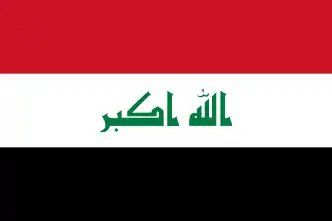Corruption in Iraq
Corruption is pervasive at all levels of government in Iraq. Public survey from Transparency International indicates that a majority of general public is not satisfied with the government's current efforts in fighting corruption.[1] Transparency International's 2017 Corruption Perceptions Index ranks the country 169th place out of 180 countries.[2]
| Political corruption | ||||||||||||
|---|---|---|---|---|---|---|---|---|---|---|---|---|
 | ||||||||||||
| Concepts | ||||||||||||
| Corruption by country | ||||||||||||
|
||||||||||||
The 2018 Transparency International Corruption Perceptions index ranked Iraq 168 out of 180. Iraq averaged 162.19 from 2003 until 2018, reaching an all-time high of 178 in 2007 and a record low of 113 in 2003.[3][4]
Dynamics
Political parties and public servants are considered corrupt, and petty corruption is highly institutionalized in Iraqi society.[5]
Corruption is considered an obstacle for doing business in Iraq, and red tape and inefficiency continue to persist. Government contracting is an area reported to be affected by high-levels of illicit activity, and public contracts are often awarded to companies connected to political leaders. Investors may come under pressure to take on well-connected local partners to avoid bureaucratic hurdles.[6]
Corruption in Iraq is endemic, systemic, and the main threat to Iraq's stability after the defeat of ISIS with more than 80% of Iraqis concerned about corruption at the highest levels of government and believing it is getting worse.[7]
In an al-Jazeera investigation, residents of Harthiya, a neighborhood in Baghdad alleged severe corruption in the construction sector. The neighborhood has experienced a construction boom since the 2003 invasion. Despite the many construction infractions, only a fraction of the revenue from government fines reaches the state treasury. Iraqi civil servants go around the neighborhood to inspect construction sites. When they spot wrongdoings, such as an extra floor in a building, an agreement is struck with the developer. The public official takes a bribe and in return, the state employee reduces the fine. The contractor pays the ticket and continues the project. Even if the builder pays in full, the fines are too small to deter construction companies when compared to the lucrative construction sector.[8]
Protests and Political Impacts
Iraqi dissatisfaction with corruption boiled over with large protests in 2018, and again in 2019 as part of ongoing protests, of which corruption in Iraq is one of the main causes, among several.[9]
Corruption in Iraq and subsequent ongoing protests of 2018 and 2019 resulted in then resignation of Prime Minister Abdel Abdul Mahdi on November 30, 2019.[10]He was replaced by Mustafa Al-Kadhimi in May of 2020.
See also
- 2018 Iraqi protests
- 2019 Iraqi protests
References
- "Global Corruption Barometer 2013". Transparency International. Retrieved 25 February 2014.
- "Corruption Perception Index 2017".
- e.V, Transparency International. "Corruption Perceptions Index 2018". www.transparency.org. Retrieved 2019-10-09.
- "Transparency International - Iraq". www.transparency.org. Retrieved 2019-10-09.
- "Global Corruption Barometer 2013". Transparency International. Retrieved 25 February 2014.
- "Iraq Country Profile". Business Anti-Corruption Portal. Archived from the original on 14 July 2015. Retrieved 14 July 2015.
- "Corruption Continues to Destabilize Iraq". Chatham House. Retrieved 2019-11-04.
- "Iraq: The changing face of Baghdad's historic neighbourhoods". Al Jazeera. September 9, 2020.
- "Protesters block roads to Iraqi port, demand end to foreign meddling". Reuters. 2019-11-03. Retrieved 2019-11-04.
- Rubin, Alissa J.; Hassan, Falih (2019-11-30). "Iraqi Prime Minister Resigns in Deepening Political Crisis". The New York Times. ISSN 0362-4331. Retrieved 2019-12-21.